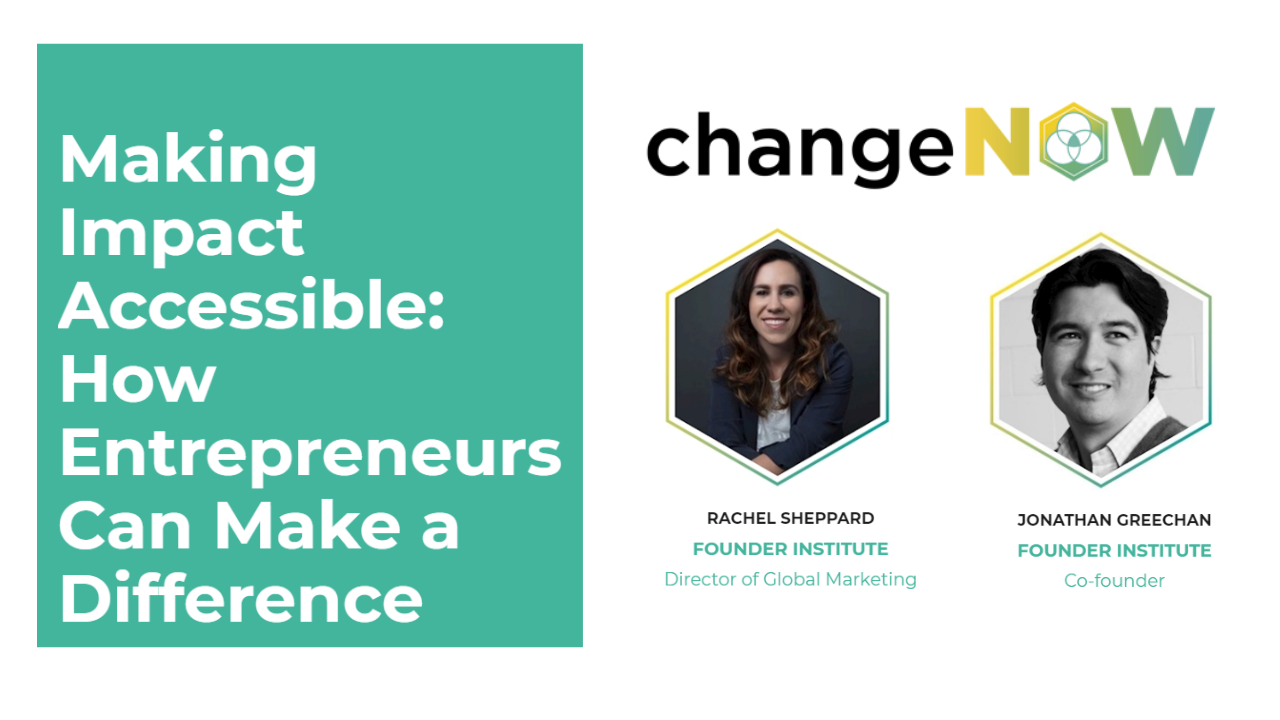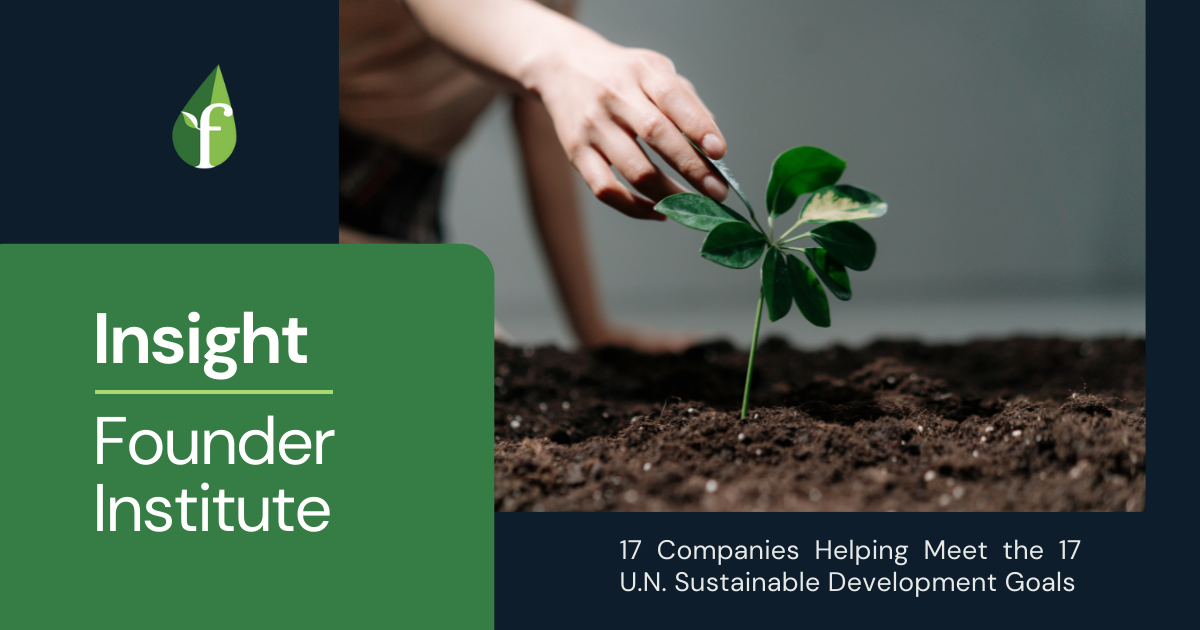
Entrepreneurship is more accessible than ever before, but entrepreneurs haven’t always used this opportunity to make the world a better place. On Founder Institute’s 10-year anniversary, we declared a mission for the next decade: By 2030, 80% of FI companies will build businesses that directly address the UN SDGs (United Nations Sustainable Development Goals).
Jonathan Greechan, Co-founder of the Founder Institute, shares FI’s “For Progress” initiative noting, “Not every entrepreneur can (or wants to) ‘change the world,’ but every entrepreneur can do their part to make progress on the SDGs. This is what ‘For Progress Companies’ are all about.”
Watch the full-length presentation from the ChangeNOW 2021 global conference, or see the highlights below:
Key Topics:
-
Democratization of entrepreneurship
-
The dark side of entrepreneurship
-
Why aren’t entrepreneurs trying to build something that matters?
-
Profit and purpose are not mutually exclusive
-
How to use FI’s Progress Planner
-
Pitch for Progress competition
-
Why companies with a cause perform better
The Democratization of Entrepreneurship
When Founder Institute celebrated its ten-year anniversary, the company reflected on a decade of supporting founders, and acknowledged how the democratization of entrepreneurship has made it more accessible than ever before. FI Co-Founder Jonathan Greechan says we are living in a golden age for startups:
The barrier to entry for people to launch business has significantly dropped. The advent of cloud technology and Amazon Web Services drove the cost to launch (online businesses) down to basically zero because you just pay as you go. Secondly, the pay-per-click model made it super easy to reach a very specific audience. Third, the amount of resources, mentorship, education, and funding that came out through new methodologies like The Lean Startup, new platforms like crowdfunding, and accelerators – all these different things came together with these new technologies to make it super easy and super cheap to launch startups.
The Dark Side of Entrepreneurship
Greechan says the ease of starting a business has also made it easier to exploit the darker sides of humanity:
The downside of things is that collectively, as a society, we have not used these ‘powers’ for the better. Instead of using these powers and innovations to make the world better and help people, most entrepreneurs have been using it to appeal to some of the worst parts of humanity - to consumerism, vanity, and political division.
Why Aren't Entrepreneurs Trying to Build Something That Matters?
Greechan asks the burning question:
Why aren’t entrepreneurs at this idea stage trying to build something that matters? We’re not all terrible people. We all generally have good intentions so why aren’t people putting their energy towards building something that is meaningful?
After posing this question to FI’s global network of founders, local leaders, and venture capitalists, Greechan found that most held the belief that they had to choose between making money or making a difference in order to be successful.
Profit & Purpose Are NOT Mutually Exclusive
Greechan says that “either/or” perspective of profit and purpose is not only unproductive, but an outdated way of thinking during an age where startups can be or do anything they want:
You’re either for-profit or you want to do something that does good in the world. That is the mentality we have. Not only is that thinking not productive, it’s outdated and there is no reason why a company can’t be for-profit and also doing good in the world. People are stuck in that mindset.
"I'm Not Trying to Change the World"
The second argument against this line of thinking goes:
I’m just trying to make payroll next month; I’m not trying to change the world. What difference can I really make against all these massive problems in the world? I’m not Elon Musk. I’m just trying to build this little business that I have.
Greechan cites a feeling of indifference and helplessness as the reason that entrepreneurs believe impact isn’t their domain.
A Terrible Excuse to NOT Have an Impact
Greechan reminds entrepreneurs that you don't have to change the world to have an impact:
Not every entrepreneur can, or needs to, ‘change the world,’ but that’s a terrible excuse to not try to have some impact. While startups don’t have the resources or connections, they DO have strength in numbers. On a yearly basis, over 650,000 companies are started in the US alone. Imagine a world where 10% of those companies are trying to do a small part towards these SDGs. That culminative impact will equal, or far surpass, the impact of big businesses.
Utility & Impact Are NOT Mutually Exclusive
Greechan says that many businesses discredit their capacity to have an impact just because they think they are too utilitarian to do so. He gives examples to disprove this notion:
- Esusu (FI San Francisco) is a SaaS product that helps renters to build credit by partnering with major credit ratings agencies so that on-time rent payments are rewarded with improved tenant credit scores, increasing financial equity and access.
- Sworkit (FI Washington, DC) is a fitness app that donates a portion of their profits to a Youth Initiative, as well as offers their app to ~11M students for free, an effort to decrease childhood obesity in support of SDG 3, Good Health and Well-being.
These companies have gotten creative, and figured out a way to do good in the world while also turning a profit.
Become For-Progress in 3 Easy Steps
Greechan says you can be a for-profit company that is for progress on the SDGs, which is why FI created a tool to make your company impactful. A for-progress company has:
- A company mission aligned with one or more SDGs
- A product or offering that positively influences Key Performance Indicators towards the SDGs, AKA "Impact Key Performance Indicators" (iKPIs)
- A public webpage that tracks progress on their iKPIs on a regular basis
When you visit fi.co/progress, the “Plan Your Progress” tool makes it easy to set attainable, measurable goals in 3 easy steps:
-
Choose causes that your business cares about and can influence:
-
Select specifc iKPIs:

-
Download your company's personalized impact plan to share with your team:
Explore the 17 SDGs and find your impact at https://fi.co/progress
Pitch for Progress Competition
FI has created a global pitch competition to highlight and empower entrepreneurs making progress on the UN SDGs. The pitch submission period is now closed, but you can visit still www.pitchforprogress.com to vote for your favorite pitch videos, learn about the competition, and register to attend the live online Demo Day on July 14.
Companies With a Cause Edge Out the Competition
Greechan says socially conscious companies perform better by attracting more customers, greater talent, more funding, and quality press:
The media loves to write about people doing good in the world, not the people squeezing another two cents out of every dollar. It is an advantage for you to do this.
Consumers are voting with their dollars. When they buy a product, they’re not just buying it because its cool. The values that that a product stands for and the causes that a brand supports is becoming a much larger part of everybody’s purchase decisions. The businesses that do not think about this stuff are putting themselves at significant disadvantage.
The following audience questions were answered during the live Q&A following the presentation:
35:33 - Are you concerned that selecting iKPIs and broadcasting your measurements can be an SDG 'green washing' tool?
38:53 - Are FI’s iKPIs exactly the same as the SDG indicators, or have you amended them?
42:20 - FI is not the only accelerator to develop its own impact methodology. Would it be helpful to create one framework to compare all impact generated?
50:28 - Is the FI methodology more applicable for forming for-profit companies?
There has truly never been a better time for entrepreneurs to leverage the power of the market to build for-profit companies that also make progress on the SDGs. Let's work together to make progress on a brighter future. Visit fi.co/progress to learn more.




